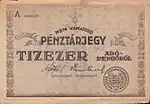Hungarian adópengő
The adópengő (in English: "tax pengő") was a temporary unit of currency of Hungary between 1 January 1946, when it was introduced to try to stabilise the pengő, and 31 July 1946, when both were replaced by the forint. Initially the adópengő was only an accounting unit used by the government and commercial banks; later, bonds and savings certificates denominated in adópengő were also issued for the public, and replaced pengő notes in circulation.
| Hungarian adópengő | |||||
|---|---|---|---|---|---|
| adópengő (Hungarian) | |||||
| |||||
| Denominations | |||||
| Symbol | AP | ||||
| Banknotes | 10 000,50 000,100 000, 500 000, 1 million, 10 million, 100 million adópengő | ||||
| Demographics | |||||
| User(s) | |||||
| Issuance | |||||
| Central bank | Hungarian State Treasury Hungarian Postal Savings Bank Hungarian National Bank | ||||
| Website | www | ||||
| Printer | Hungarian Banknote Printing Corp. | ||||
| Website | www | ||||
| Valuation | |||||
| Inflation | 3,572·106% | ||||
| Source | [1] | ||||
This infobox shows the latest status before this currency was rendered obsolete. | |||||
Statistics
| Date | Index number[2] |
|---|---|
| 1 January 1946 | 1 |
| 1 February 1946 | 1.7 |
| 1 March 1946 | 10 |
| 1 April 1946 | 44 |
| 1 May 1946 | 630 |
| 1 June 1946 | 160,000 |
| 1 July 1946 | 7,500,000,000 (7.5×109) |
| 31 July 1946 | 2,000,000,000,000,000,000,000 (2×1021, 2 sextillion, or 2,000 million million million) |
References
- History of the Hungarian hyperinflation
- "Pénzportál – Garami Erika: A hiperinfláció számokban". Archived from the original on 2011-07-21. Retrieved 2010-12-31.
| Preceded by: Hungarian pengő Reason: to create a numerical basis for budget calculations Ratio: at par |
Currency of Hungary 1 January 1946 – 31 July 1946 Concurrent with: pengő |
Circulates in Hungary 1 August 1946 – 30 September 1946 Concurrent with: forint |
Succeeded by: Hungarian forint Reason: Hyperinflation Ratio: 1 forint = 2×108 adópengő |
This article is issued from Wikipedia. The text is licensed under Creative Commons - Attribution - Sharealike. Additional terms may apply for the media files.

